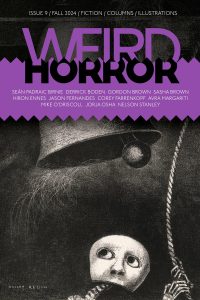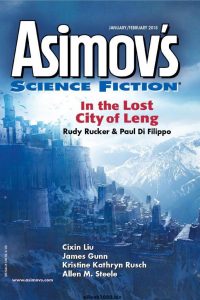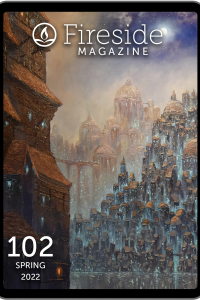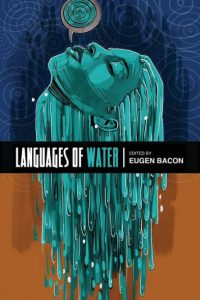The Dark, Uncanny, Apex, and Weird Horror Fall: Short Fiction Reviews by Paula Guran
 The Dark 6/24
The Dark 6/24
Uncanny 7-8/24
Apex #145
Weird Horror Fall ’24
The Dark #109 features two originals. “The Abandoned” by Jack Klausner is a haunting story that begins with a little girl finding a box in the schoolyard. It takes us through tragic mystery and ends in resignation. The protagonist in Beth Goder’s interesting “Labyrinth” visits the infamous Winchester Mystery House in a story that explores “how the past reaches into the present, how history is made up of the stories we tell and so much more, how the past caresses us, ghostlike, with us always, a labyrinth that we can never find our way out of.”
Uncanny #59 features seven quite varied originals. Anchorwoman Veronica has been estranged from her sister Violet for over four decades when she finally decides to reconnect in “Signs of Life” by Sarah Pinsker. She journeys to Violet’s rural home in West Virginia and, after reconciling with her sibling, Veronica learns the truth about their past and commits to an unanticipated future. A charming, positive novelette about how creativity grows from need. In Greg van Eekhout’s short and vivid “Across the Street”, the narrator’s regular lunchtime walk suddenly takes him from the mundane to the extraordinary.
A staff member and an odd client at a Korean hot spring bathhouse undergo radical changes and experience self-revelation in the atmospheric “The Midnight Spa” by Sunwoo Jeong. John Chu’s “Wonderland Is a Parking Lot in Revere” is an indescribable novelette about a young computer engineer/tenor who remembers two similar but not identical versions of his life and faces a choice about his future. Despite the fact I never fully understood what being “marked” meant, it is an emotionally compelling story that held my attention.
Lucy’s grandmother taught her not only how to sew, but the importance of pockets. When she dies, in the engaging “Something Small Enough to Ask For” by AnaMaria Curtis, college student Lucy inherits her sewing machine and half a yard of fabric embroidered with flowers. Rubbing the flowers take her back to her past. She comforts herself with memories for six years until she recalls more of Grandma Irene’s advice and can move forward
“Zarghána” by Eleanna Castroianni is both poetic and primal. On an island, women wait for their men to return from the sea. They embrace their shared destiny and devotion to an unforgiving sea goddess. You can smell the ocean and taste the fish in this one.
Megan Chee’s “The Worms that Ate the Universe” reveals the way the universe ends: Over millions of years, mindless worms eat their way through it. Wormholes may never have the same meaning for you. Comforting in a way. At least we have a lot of time left.
All four of the original short stories in Apex #145 are worthy of reading. Daniela Tomova’s “Our Lady of the Clay” is a dark but lovely and layered tale of two young brothers trying to set things right. Ansel, the elder, takes Nico into a forest that is no longer visible – destroyed by a mine explosion – to find the Lady of the Clay, in hopes their devastating reality can be altered.
In “The Owl” by Stephen M.A. a man survives a harsh childhood, abandonment by the fellow misfits he cares for, and the virus-borne annihilation of humanity. As the end of the world arrives, he considers his life and whether his memories should survive. The details of the narrator’s life are convincing; the surreal/symbolic aspects of the tale may or may not work for the reader.
The brutal truths that “anguish sells” and “pain creates empathy” lie at the core of Marie Croke’s “A Lullaby of Anguish”. When sisters Cassia and Antonia were young, they inflicted pain and suffering on the mer children in tide pools near their home. Now someone is exploiting the drug-addicted Antonia on the chance he can gain access to the children of the sea. There are aspects of the story that I can’t quite accept – why, for instance, no one, has figured out where they lived and found the tidepools. The father was a famous photographer, so tracking various homes should be easier than long-term manipulation of Antonia. But perhaps you can overlook such niceties.
Junie, in “Loss Prevention” by Pamela Rentz, works surveillance in the tribe’s Orbital Casino, but she uses the system for her own goals. It’s a subtle tale that, at its heart, is about the real problem of missing and murdered Indigenous women – a tragedy that has existed for centuries and, here, sadly, still exists in the future. Perhaps current surveillance is not quite as high-tech as that portrayed, but otherwise I think the casino could be on Earth and need not be science fictional. Junie should be the protagonist of a novel.
The issue also includes two pieces of good flash fiction: “What Is Conjured Shall Vanish” by Akis Linardos and “Intertwined” by Anne Wilkins. The former is a dark fantasy take on how the downtrodden manage to fight those in power. The latter is a love story set in dystopic future. Surprisingly deep and moving for only 900 words
Seán Padraic Birnie’s “Black Water” leads off Weird Horror Fall ’24. It is not a unique tale – protagonist meets woman, woman does something invasive, horror results – but he tells it so very well that it seems fresh. The protagonist in the creepy “New in Town” by Corey Farrenkopf becomes a member of their new community through several terrifying encounters – hazing by horror.
Kirsten, who has a “weird obsession with dark shit,” and friend Tyler visit what seems to be one of those “haunted house experiences” in the chilling “It Knows What’s Under Your Skin” by Jason Fernandes. This experience, however, is based on the deepest of personal secrets the knowledge of which are, these days, probably as accessible as this short but sinister tale relates.
“All the Devils Are Here” by Mike O’Driscoll centers on an actor whose last role ended with the COVID pandemic. He is waiting in a pub for a friend who never shows up. The story conveys a growing sense of disconnection and disorientation very well, but the ending was rather a disappointment. Also disconcerting, the leaflets referred to in “Fliers” by Gordon Brown are baffling missives that drive their recipient around several bends.
The evocative “Our Best Selves” by Hiron Ennes is truly weird. A family moves to a rural fixer-upper made of stone surrounded – even permeated – by vegetation and adapts to their environment. Eventually they prove the mother’s contention that they “never need anything but sun and soil and rain and time” to be their best selves.
Romani Traveler culture provides background and a plot element for Nelson Stanley’s “Stopping Places”. In it, the young protagonist discovers her second cousin is something other than just another girl. With a quirky ending, Jorja Osha’s “Rippling Salt, Like Rolling Waves” – a tale about investigators, a missing sister, multiple dead found on beaches, and a sea monster – is effective.
Recommended Stories:
“Black Water”, Seán Padraic Birnie (Weird Horror Fall ’24)
“Our Best Selves”, Hiron Ennes (Weird Horror Fall 2024)
“Signs of Life”, Sarah Pinsker (Uncanny 7-8/24)
“Our Lady of the Clay”, Daniela Tomova (Apex #145)
Paula Guran has edited more than 40 science fiction, fantasy, and horror anthologies and more than 50 novels and collections featuring the same. She’s reviewed and written articles for dozens of publications. She lives in Akron OH, near enough to her grandchildren to frequently be indulgent.
This review and more like it in the September 2024 issue of Locus.
 While you are here, please take a moment to support Locus with a one-time or recurring donation. We rely on reader donations to keep the magazine and site going, and would like to keep the site paywall free, but WE NEED YOUR FINANCIAL SUPPORT to continue quality coverage of the science fiction and fantasy field.
While you are here, please take a moment to support Locus with a one-time or recurring donation. We rely on reader donations to keep the magazine and site going, and would like to keep the site paywall free, but WE NEED YOUR FINANCIAL SUPPORT to continue quality coverage of the science fiction and fantasy field.
©Locus Magazine. Copyrighted material may not be republished without permission of LSFF.






